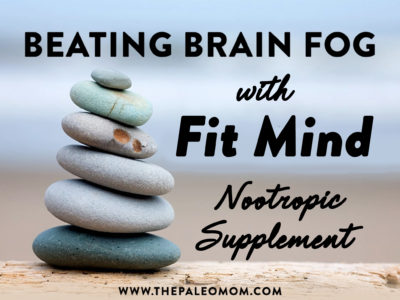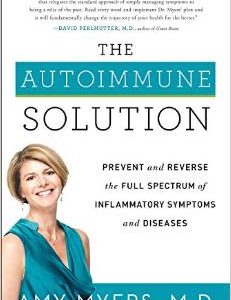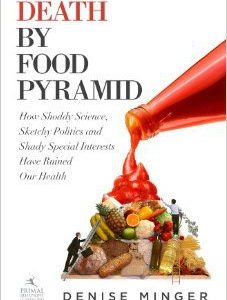When it comes to supplements, one of the biggest challenges is navigating the overwhelming number of products available, and finding which ones are backed by legitimate research (especially human studies!). This is particularly true when it comes to nootropics, a class of chemicals that enhance memory or other cognitive functions. Not surprisingly, the market of nootropics is growing rapidly (let’s face it, who doesn’t need a brain boost these days?!), leaving us with a huge variety of products to choose from. Whether you’re dealing with brain fog or just want to up your cognitive game, the question is the same: What should we pick when we want to cut through the hype and find something truly science-based?
Table of Contents[Hide][Show]
As I’ve written about previously (Achieving Work-Life Balance with a Fit Mind), my favorite nootropic supplement is Fit Mind by Restorative Blends. Not only have I experienced enormous cognitive benefits from using it myself, but every ingredient it contains is backed by a body of scientific evidence supporting its effects (which is super important; none of us are immune to the placebo effect, so well-designed studies are generally worth way more than personal anecdotes!).
Get 20% off with code ‘PALEOMOM’
Save 80% Off the Foundations of Health
Expand your health knowledge on a wide range of topics relevant to you, from how to evaluate scientific studies, to therapeutic diet and lifestyle, to leaky gut and gut microbiome health, to sustainable weight loss, and much more!!!

Fit Mind is a nootropic supplement that blends antioxidant vitamin E with the well-researched nootropics CDP-Choline, L-Carnosine, Panax Ginseng, Ginko Biloba, Bacopa Monnieri, Phosphatidylserine and Acetyle L-Carnitine HCL.
Let’s take a closer look at the nootropic effects of these ingredients to see how they benefit our brain!
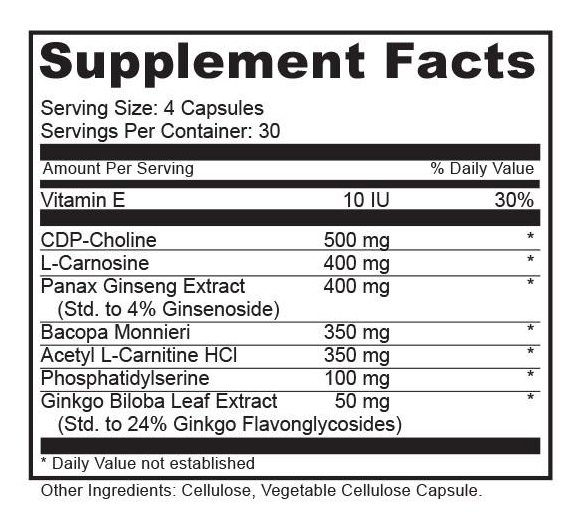 Cytidine Diphosphate-Choline (CDP-Choline, or Citicoline).
Cytidine Diphosphate-Choline (CDP-Choline, or Citicoline).
Choline has received plenty of airtime lately thanks to its role in liver health and neurological function (and not to mention, helped redeem egg yolks, which are one of its most abundant sources!). When it comes to nootropics, the phospholipid CDP-choline is particularly useful for our cognitive health. Not only does it supply our bodies with choline, it also provides cytidine—a component of ribonucleic acid (RNA) that can get converted into uridine (another component of RNA) once it enters the brain. Uridine is a big player in repairing neurons and cell membranes, in turn boosting brain plasticity and helping improve memory. So, CDP-choline delivers a pretty impressive package deal!
But, what do the clinical trials say? Even well-designed studies using humans suggest that CDP-choline is a highly effective nootropic supplement. One study of healthy adult women found that after four weeks of supplementing with either 250 mg or 500 mg daily of CDP-choline, cognitive performance test scores improved (fewer omission and commission errors) compared to the placebo group, suggesting an increase in attentional performance. Additional trials have shown that CDP-choline (at doses of 500 to 2000 mg daily) can help improve verbal memory formation and memory recall in the elderly. And, among healthy adolescent males, supplementing with 250 or 500 mg daily of CDP-choline has been shown to improve attention and psychomotor speed, compared to a placebo.
What’s exciting about CDP-choline is that it appears to have benefits for people of any age, gender, or cognitive baseline (that is, both healthy people and people with existing cognitive disorders can see improvements!).
L-Carnosine.
L-carnosine is a dipeptide (consisting of the amino acids beta-alanine and histidine) found most abundantly in meat products, and heavily concentrated in our brains. Along with being a powerful antioxidant (helping protect brain cells from oxidative damage), L-carnosine helps increase the energy output of our mitochondria. It even holds potential for reducing the symptoms of Alzheimer’s disease and other neurodegenerative disorders!
Much of what we know about L-carnosine comes from a compelling mixture of rodent and in vitro studies demonstrating its ability to protect brain cells against nitric oxide-induced damage, improve neurological function after stroke conditions, and cause an overall improvement in brain function. But, the existing clinical trials are also compelling! In human studies, L-carnosine has been shown to enhance neurologic function in children with autism spectrum disorders (at a supplemental intake of 800 mg of L-carnosine per day) and improve cognition in symptomatically stable schizophrenics (at an intake of 2 g per day). Among the elderly, carnosine combined with anserine (a total of 1 g daily with three parts anserine and one part carnosine) has been shown to preserve verbal episodic memory. Collectively, the evidence points to some serious cognitive benefits from supplementing with L-carnosine! Take that brain fog!
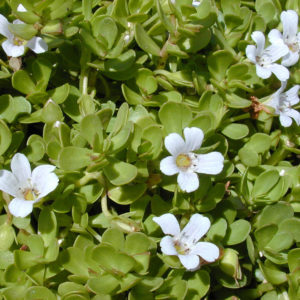
Bacopa monnieri.
Bacopa monnieri might not be a household name, but this nootropic herb can be a major brain booster. Also known as water hyssop (and commonly used in Chinese and Ayurvedic medicine), Bacopa monnieri appears to promote the growth of nerve endings, in turn enhancing neuron communication. Some of its most thoroughly demonstrated effects are reducing anxiety and improving memory formation.
In human trials, supplementing with 300 mg of Bacopa monnieri daily has been shown to improve memory acquisition and retention, decrease symptoms of anxiety, boost retention of new information, and improve working memory (especially spatial working memory accuracy) among a wide range of ages. Doses of 320 mg daily have also been shown to boost cognitive performance in healthy adults. Even doses as low as 125 mg per day appear to improve mental control, logical memory, and paired associated learning among healthy participants.
A meta-analysis of randomized controlled trials on adults taking Bacopa monnieri found that the herb can, indeed, significantly improve cognition, particularly when it comes to speed of attention. And, another meta-analysis of children and adolescents found that Bacopa monnieri consistently and significantly improved elements of cognition, behavior, and attention-deficit domains!
Acetyl L-carnitine HCl (ALCAR).
ALCAR is the acetylated form of the amino acid L-carnitine (the acetylated version provides higher bioavailability and stronger nootropic effects than L-carnitine alone!). On top of being well-studied for its perks for body composition and athletic performance, different forms of L-carnitine can help support neuron health, improve cognitive capacity, and increase attention and alertness.
ALCAR helps our body biosynthesize choline into acetylcholine, by increasing the availability of Acetyl-CoA (which binds with choline to create acetylcholine). This is important both directly and indirectly: along with acetylcholine playing an important role as a neurotransmitter, too-low levels of acetylcholine can reduce the benefits of certain other nootropic supplements, including choline! So, ALCAR is helpful in part due to its ability to enhance the effectiveness of other brain boosters.
Beyond supporting acetylcholine production, ALCAR has benefits for specific groups of people that have been confirmed in human trials. Among people with chronic fatigue syndrome, ALCAR (at an intake of 2 g per day) was able to improve concentration and mental fatigue. Similarly, among the elderly, ALCAR supplementation has been shown to reduce mental fatigue and improve cognition. Additional research suggests improvement of symptoms for people with ADHD and autism spectrum disorders who supplement with ALCAR.
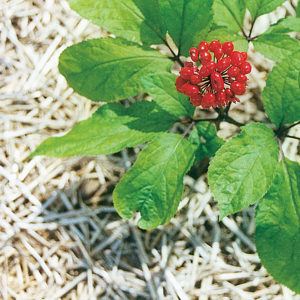 Panax Ginseng.
Panax Ginseng.
Panax ginseng (also called Asian ginseng) is an herb with a long history of use in Chinese medicine. And, even Western medicine is showing it can be a powerful nootropic supplement!
In one study, 200 mg per day of Panax ginseng improved scores for social functioning and mental health after four weeks (although the longer-term effects seemed to diminish). Other trials suggest Panax ginseng may improve reaction time, reduce the frequency of errors in cognitive tests, and improve alertness. This herb seems to be most effective for people with fatigue, due to its ability to increase cognition through anti-fatigue effects.
Phosphatidylserine.
Phosphatidylserine is a phospholipid (a major component of cell membranes) with significant benefits for working memory and cognition. In our bodies, it’s highly concentrated in neural tissue, where it serves as a building block for brain cells! Even though our body can make some on its own, boosting our intake through diet or supplements results in documented nootropic effects.
A number of studies on humans show that phosphatidylserine can boost memory and protect against cognitive decline among various populations. In the elderly, doses of 300 mg per day resulted in improvements in cognitive decline and dementia scores; the same dose was able to reduce symptoms of cognitive decline in Alzheimer’s patients. In healthy college-aged males, 400 mg daily of phosphatidylserine increased the speed of calculations and improved accuracy on a cognitive function test, compared to the placebo group. Additional trials show reductions of ADHD symptoms in children following phosphatidylserine supplementation, including lower inattention and emotional lability. And, phosphatidylserine can even benefit depression: among elderly women, supplementing with 300 mg of phosphatidylserine daily for 30 days was able to reduce symptoms of depression by an average of 70%!
 Ginkgo Biloba Leaf Extract.
Ginkgo Biloba Leaf Extract.
Ginkgo biloba is one of the oldest tree species on planet earth! Science is confirming that extracts from the leaf of this ancient plant not only have benefits for our overall health, but can also specifically enhance memory, improve cognition, and serve as a brain protectant.
An impressive body of literature confirms that gingko biloba extract can help people protect the memory and cognition of people with different forms of dementia. One study found that among Alzheimer’s patients, gingko biloba was just as effective as a standard Alzheimer’s medicine (Donezepil) in reducing cognitive impairment. Another trial found that taking 240 mg per day of gingko biloba extract was able to improve cognitive functioning, neuropsychiatric symptoms, and functional abilities in people with vascular dementia or Alzheimer’s disease. And for people with age-related cognitive impairment but no diagnosed dementia? In one study, three months of supplementing with gingko biloba improved mental efficiency and reaction time compared to a placebo group; and in another study, 180 mg daily of ginkgo biloba extract improved memory and processing speed! Likewise, cognitive benefits have been found in healthy middle-aged men and women (taking 240 mg of gingko biloba extract each day resulted in better information recall) and in healthy young people aged 18-29 (taking 360 mg of gingko biloba extract resulted in faster responses during a Serial Threes and Serial Sevens test—where participants count backwards from 100 in increments of three or seven—and higher doses improved accuracy of those responses).
Beating Brain Fog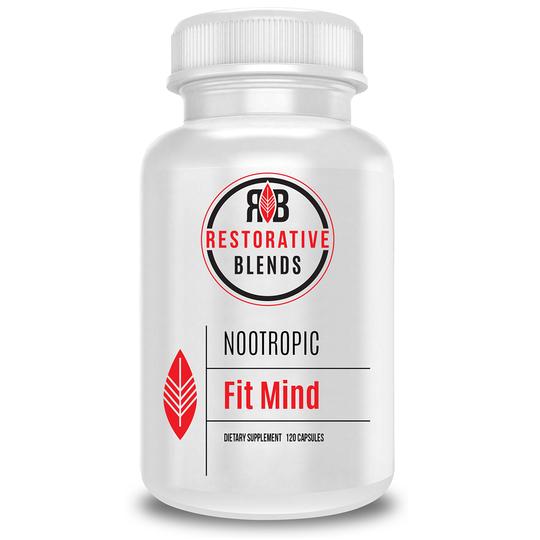
In the supplement world, many products are promoted based on evidence from in vitro studies and animal models (if there’s any scientific evidence at all!). Although these kinds of studies are important starting points, they rarely translate perfectly to the human body, leading to a market full of supplements that might not be truly effective. One of the biggest points in favor of Fit Mind is that every ingredient has proven nootropic effects in human beings—creating a synergistic product that we can be confident about taking!
Get 20% off with code ‘PALEOMOM’
One last note to my AIP readers: Many of these ingredients also have profound anti-inflammatory effects that could benefit autoimmune disease. For example, panax ginseng can downregulate Th17 cells, a common culprit in autoimmune disease. And ginkgo biloba decreases TNF-α, NF-κB and IL-6 expression. Bacopa monnieri has potent anti-inflammatory properties but there’s also preliminary evidence that it might increase IgA and IgG antibody production via a differential effect on Th1 versus Th2 cell subsets. There’s not a compelling reason to label this supplement as “not AIP” and there’s some serious ticks in the pros column, but as always with supplements for those with autoimmune disease, I recommend proceeding cautiously and discussing first with a healthcare provider first.
Citations
Alvarez XA, et al. “Citicoline improves memory performance in elderly subjects.” Methods Find Exp Clin Pharmacol. 1997 Apr;19(3):201-10.
Benson S, et al. “An acute, double-blind, placebo-controlled cross-over study of 320 mg and 640 mg doses of Bacopa monnieri (CDRI 08) on multitasking stress reactivity and mood.” Phytother Res. 2014 Apr;28(4):551-9. doi: 10.1002/ptr.5029. Epub 2013 Jun 21.
Brownrigg TD, et al. “Carnosine protects against the neurotoxic effects of a serotonin-derived melanoid.” Neurochem Res. 2011 Mar;36(3):467-75. doi: 10.1007/s11064-010-0365-2. Epub 2010 Dec 14.
Budzeń S & Rymaszewska J. “The biological role of carnosine and its possible applications in medicine.” Adv Clin Exp Med. 2013 Sep-Oct;22(5):739-44.
Calabrese V, et al. “Cellular stress response: a novel target for chemoprevention and nutritional neuroprotection in aging, neurodegenerative disorders and longevity.” Neurochem Res. 2008 Dec;33(12):2444-71. doi: 10.1007/s11064-008-9775-9. Epub 2008 Jul 16.
Chez MG, et al. “Double-blind, placebo-controlled study of L-carnosine supplementation in children with autistic spectrum disorders.” J Child Neurol. 2002 Nov;17(11):833-7.
Crook T, et al. “Effects of phosphatidylserine in Alzheimer’s disease.” Psychopharmacol Bull. 1992;28(1):61-6.
Downey LA, et al. “An acute, double-blind, placebo-controlled crossover study of 320 mg and 640 mg doses of a special extract of Bacopa monnieri (CDRI 08) on sustained cognitive performance.” Phytother Res. 2013 Sep;27(9):1407-13. doi: 10.1002/ptr.4864. Epub 2012 Dec 19.
Ellis JM & Reddy P. “Effects of Panax ginseng on quality of life.” Ann Pharmacother. 2002 Mar;36(3):375-9.
Geier DA, et al. “A prospective double-blind, randomized clinical trial of levocarnitine to treat autism spectrum disorders.” Med Sci Monit. 2011 Jun;17(6):PI15-23.
Hipkiss AR. “Could carnosine or related structures suppress Alzheimer’s disease?” J Alzheimers Dis. 2007 May;11(2):229-40.
Hirayama S, et al. “The effect of phosphatidylserine administration on memory and symptoms of attention-deficit hyperactivity disorder: a randomised, double-blind, placebo-controlled clinical trial.” J Hum Nutr Diet. 2014 Apr;27 Suppl 2:284-91. doi: 10.1111/jhn.12090. Epub 2013 Mar 17.
Hisatsune T, et al. “Effect of Anserine/Carnosine Supplementation on Verbal Episodic Memory in Elderly People.” J Alzheimers Dis. 2016;50(1):149-59. doi: 10.3233/JAD-150767.
Ihi R, et al. “Efficacy and tolerability of a once daily formulation of Ginkgo biloba extract EGb 761® in Alzheimer’s disease and vascular dementia: results from a randomised controlled trial.” Pharmacopsychiatry. 2012 Mar;45(2):41-6. doi: 10.1055/s-0031-1291217. Epub 2011 Nov 15.
Kaschel R. “Specific memory effects of Ginkgo biloba extract EGb 761 in middle-aged healthy volunteers.” Phytomedicine. 2011 Nov 15;18(14):1202-7. doi: 10.1016/j.phymed.2011.06.021. Epub 2011 Jul 30.
Kato-Kataoka A, et al. “Soybean-derived phosphatidylserine improves memory function of the elderly Japanese subjects with memory complaints.” J Clin Biochem Nutr. 2010 Nov;47(3):246-55. doi: 10.3164/jcbn.10-62. Epub 2010 Sep 29.
Kean JD, et al. “A systematic review of the Ayurvedic medicinal herb Bacopa monnieri in child and adolescent populations.” Complement Ther Med. 2016 Dec;29:56-62. doi: 10.1016/j.ctim.2016.09.002. Epub 2016 Sep 4.
Kennedy DO, et al. “Modulation of cognition and mood following administration of single doses of Ginkgo biloba, ginseng, and a ginkgo/ginseng combination to healthy young adults.” Physiol Behav. 2002 Apr 15;75(5):739-51.
Knott V, et al. “Effects of acute CDP-choline treatment on resting state brain oscillations in healthy volunteers.” Neurosci Lett. 2015 Mar 30;591:121-5. doi: 10.1016/j.neulet.2015.02.032. Epub 2015 Feb 17.
Kongkeaw C, et al. “Meta-analysis of randomized controlled trials on cognitive effects of Bacopa monnieri extract.” J Ethnopharmacol. 2014;151(1):528-35. doi: 10.1016/j.jep.2013.11.008. Epub 2013 Nov 16.
Maggioni M, et al. “Effects of phosphatidylserine therapy in geriatric patients with depressive disorders.” Acta Psychiatr Scand. 1990 Mar;81(3):265-70.
McGlade E, et al. “Improved Attentional Performance Following Citicoline Administration in Healthy Adult Women.” FNS. Jun 2012;3(6).
McGlade E, et al. “The Effect of Citicoline Supplementation on Motor Speed and Attention in Adolescent Males.” J Atten Disord. 2015 Jul 15. pii: 1087054715593633.
Malaguarnera M, et al. “Acetyl L-carnitine (ALC) treatment in elderly patients with fatigue.” Arch Gerontol Geriatr. 2008 Mar-Apr;46(2):181-90. Epub 2007 Jul 20.
Min J, et al. “Differential neuroprotective effects of carnosine, anserine, and N-acetyl carnosine against permanent focal ischemia.” J Neurosci Res. 2008 Oct;86(13):2984-91. doi: 10.1002/jnr.21744.
Mix JA & Crews WD Jr. “An examination of the efficacy of Ginkgo biloba extract EGb761 on the neuropsychologic functioning of cognitively intact older adults.” J Altern Complement Med. 2000 Jun;6(3):219-29.
Morgan A & Stevens J. “Does Bacopa monnieri improve memory performance in older persons? Results of a randomized, placebo-controlled, double-blind trial.” J Altern Complement Med. 2010 Jul;16(7):753-9. doi: 10.1089/acm.2009.0342.
Parker AG, et al. “The effects of IQPLUS Focus on cognitive function, mood and endocrine response before and following acute exercise.” J Int Soc Sports Nutr. 2011 Oct 21;8:16. doi: 10.1186/1550-2783-8-16.
Raghav S, et al. “Randomized controlled trial of standardized Bacopa monniera extract in age-associated memory impairment.” Indian J Psychiatry. 2006 Oct;48(4):238-42. doi: 10.4103/0019-5545.31555.
Reay JL, et al. “Panax ginseng (G115) improves aspects of working memory performance and subjective ratings of calmness in healthy young adults.” Hum Psychopharmacol. 2010 Aug;25(6):462-71. doi: 10.1002/hup.1138.
Roodenrys S, et al. “Chronic effects of Brahmi (Bacopa monnieri) on human memory.” Neuropsychopharmacology. 2002 Aug;27(2):279-81.
Secades JJ & Lorenzo JL. “Citicoline: pharmacological and clinical review, 2006 update.” Methods Find Exp Clin Pharmacol. 2006 Sep;28 Suppl B:1-56.
Scholey AB & Kennedy DO. “Acute, dose-dependent cognitive effects of Ginkgo biloba, Panax ginseng and their combination in healthy young volunteers: differential interactions with cognitive demand.” Hum Psychopharmacol. 2002 Jan;17(1):35-44.
Spiers PA, et al. “Citicoline improves verbal memory in aging.” Arch Neurol. 1996 May;53(5):441-8.
Stough C, et al. “Examining the nootropic effects of a special extract of Bacopa monniera on human cognitive functioning: 90 day double-blind placebo-controlled randomized trial.” Phytother Res. 2008 Dec;22(12):1629-34. doi: 10.1002/ptr.2537.
Tanida M, et al. “Dose-dependent effects of L-carnosine on the renal sympathetic nerve and blood pressure in urethane-anesthetized rats.” Am J Physiol Regul Integr Comp Physiol. 2005 Feb;288(2):R447-55. Epub 2004 Oct 21.
Vermeulen RC & Scholte HR. “Exploratory open label, randomized study of acetyl- and propionylcarnitine in chronic fatigue syndrome.” Psychosom Med. 2004 Mar-Apr;66(2):276-82.
Wesnes K, et al. “A double-blind placebo-controlled trial of tanakan in the treatment of idiopathic cognitive impairment in the elderly.” Human Psychopharmacology: Clinical & Experimental. 1987;2(3):159-169.
Yancheva S, et al. “Ginkgo biloba extract EGb 761(R), donepezil or both combined in the treatment of Alzheimer’s disease with neuropsychiatric features: a randomised, double-blind, exploratory trial.” Aging Ment Health. 2009 Mar;13(2):183-90. doi: 10.1080/13607860902749057.

